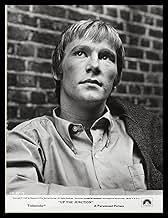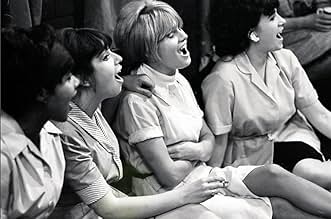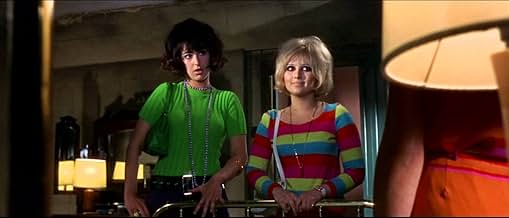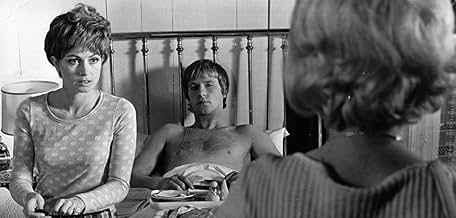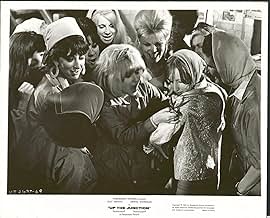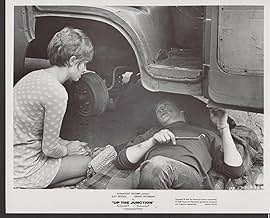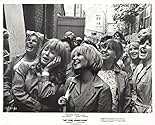NOTE IMDb
6,9/10
1,1 k
MA NOTE
Ajouter une intrigue dans votre langueAddresses some of the major 60s social issues - a bored rich London-girl from Chelsea decides to go "slumming" in depressed Battersea, getting a flat and starts factory-work and makes friend... Tout lireAddresses some of the major 60s social issues - a bored rich London-girl from Chelsea decides to go "slumming" in depressed Battersea, getting a flat and starts factory-work and makes friends... of which one has to get an illegal abortion.Addresses some of the major 60s social issues - a bored rich London-girl from Chelsea decides to go "slumming" in depressed Battersea, getting a flat and starts factory-work and makes friends... of which one has to get an illegal abortion.
- Réalisation
- Scénario
- Casting principal
- Récompenses
- 1 nomination au total
Avis à la une
I first saw this film on late night TV in Melbourne, Australia, in the late 1980s. I love it then, but wasn't able to view it again until recently, and enjoyed it as much as my first viewing almost 30 years earlier.
One of the first things I remembered thinking after first viewing it is – why isn't this film better known? It's one of the great British films of the 1960s, and a fine example of the 'kitchen sink' genre. Added to that, it has superb widescreen cinematography – every scene is beautifully shot, the outdoor scenes particularly so. Working class London in the 60s was a ramshackle, beautiful if run-down environment. The film captures a lost world – it's a fascinating historical document as well as a serious movie.
The cast is spot on,it's all very believable, and the leads have a genuine chemistry. Suzy Kendall may have had a limited acting range – but she's perfect in this role. And so beautiful!
The story tackles all manner of social problems not just of the 60s, but universal ones applicable today as then. Some scenes are still quite disturbing to watch – this is not some 'swinging London' expose, but an accurate glimpse in to the life of working class Londoners before the gentrification process started.
I was fortunate to study British film at Monash Univeristy (Melbourne) under the great Brian MacFarlane in the 1990s. He's considered the world expert on British cinema, and was commissioned by the British Film Academy to write the authorised history of British cinema. One of the things MacFarlane consistently highlighted was the fact Brit film only began to portray the working class seriously from the late 1950s. Prior to that, working class were portrayed in movies as either servants, idiots, criminals or downtrodden miners etc. Up the Junction is a beautifully realised example of a time when the British finally began to take the working class seriously.
It's also the first film I can think of with a soundtrack written by a well known rock band – Manfred Mann. And though dated – the music is perfect for this film and captures something of the youth vibe then flowering across the western world. Truly – this is a shamefully underrated film and a must-see for anyone interested in London in the 1960s.
One of the first things I remembered thinking after first viewing it is – why isn't this film better known? It's one of the great British films of the 1960s, and a fine example of the 'kitchen sink' genre. Added to that, it has superb widescreen cinematography – every scene is beautifully shot, the outdoor scenes particularly so. Working class London in the 60s was a ramshackle, beautiful if run-down environment. The film captures a lost world – it's a fascinating historical document as well as a serious movie.
The cast is spot on,it's all very believable, and the leads have a genuine chemistry. Suzy Kendall may have had a limited acting range – but she's perfect in this role. And so beautiful!
The story tackles all manner of social problems not just of the 60s, but universal ones applicable today as then. Some scenes are still quite disturbing to watch – this is not some 'swinging London' expose, but an accurate glimpse in to the life of working class Londoners before the gentrification process started.
I was fortunate to study British film at Monash Univeristy (Melbourne) under the great Brian MacFarlane in the 1990s. He's considered the world expert on British cinema, and was commissioned by the British Film Academy to write the authorised history of British cinema. One of the things MacFarlane consistently highlighted was the fact Brit film only began to portray the working class seriously from the late 1950s. Prior to that, working class were portrayed in movies as either servants, idiots, criminals or downtrodden miners etc. Up the Junction is a beautifully realised example of a time when the British finally began to take the working class seriously.
It's also the first film I can think of with a soundtrack written by a well known rock band – Manfred Mann. And though dated – the music is perfect for this film and captures something of the youth vibe then flowering across the western world. Truly – this is a shamefully underrated film and a must-see for anyone interested in London in the 1960s.
Peter Collinson was already mellowing after his directorial debut with the incredibly nasty home invasion film 'The Penthouse' (1967); and let loose on Nell Dunn's stories in Technicolor with Manfred Mann on the soundtrack was obviously going to turn in a very different film from Ken Loach's 'Wednesday Play' of 1965.
What seemed like gritty realism in 1967 today seems as remote as the world evoked by Dickens (complete with Jewish stereotypes which really date it). Maureen Lipman is almost unrecognisably young and it's always good to see Adrienne Posta and Liz Fraser (who share a literally gut-renching sequence after the former has an abortion performed by a drunken Hylda Baker).
But the real star is Battersea power station, looming in the background back in the days when it was still permitted to smoke.
What seemed like gritty realism in 1967 today seems as remote as the world evoked by Dickens (complete with Jewish stereotypes which really date it). Maureen Lipman is almost unrecognisably young and it's always good to see Adrienne Posta and Liz Fraser (who share a literally gut-renching sequence after the former has an abortion performed by a drunken Hylda Baker).
But the real star is Battersea power station, looming in the background back in the days when it was still permitted to smoke.
This movie had a profound effect on me when I first craned my neck to see it from the front row of the Haymarket cinema in Newcastle upon Tyne. I was sixteen years old and on date with a guy that had a rich father, a triumph spitfire and the personality of deadwood. I fell deeply in love with Suzy Kendall knowing that it should have been Dennis Waterman. I saw this movie every night for two weeks. It captures those times exquisitely, almost painfully. I just need to hear the opening theme to be transported back. The clash of cultures, the poverty on both sides of the class divide. Polly had money but was surrounded by shallowness and snobbery. Her friends up the junction had loyalty, camaraderie and fun, but struggled to survive, scamming their way from pay day to pub, who was the poorer? Manfred Mann's excellent score insinuates it's way into the fabric of the movie, haunting and evocative. Give this one a chance, you won't regret it.
This is one of my all time favourite films. OK so the plot is not fantastic ( certainly better than some of the same era !! ), but anyone who loves the 60's will revel in its nostalgia, the cars, the buildings, the fashions.... simply superb!, it all harks back to a much more simpler, although harder way of life. I was born in the 60's & love the 50's/60,s era, this film started my interest in films of this time, so if you love this film then also see :- A KIND OF LOVING. LONELINESS OF A LONG DISTANCE RUNNER. POOR COW. LEATHER BOYS. CATHY COME HOME. Saturday NIGHT , Sunday MORNING. SMASHING TIME. HERE WE GO ROUND THE MULBERRY BUSH. BILLY LIAR. A TASTE OF HONEY. SPARROWS CANT SING. GIRL WITH GREEN EYES. A KID FOR 2 FARTHINGS. TO SIR WITH LOVE. So close the curtains, put the cat out, turn the lights off & watch this film.... you will be hooked, i promise !
A portrayal of women's lives in 1960s working class Battersea, through the eyes of a girl from Chelsea, hence an outsider. Based on the better known book by Nell Dunn, from which it departs significantly, making the ill-fated affair with Dennis Waterman's character the central narrative. Beautifully done. Deserves to be better known than it is.
Le saviez-vous
- GaffesWhen Sylvie and Rube are singing in the pub, there are many cutaways which show the pub customers joining in the songs. On most of these, a large piece of dirt is visible at the top of the frame. Someone didn't perform the obligatory "hair in the gate" check before loading the film.
- ConnexionsFeatured in Film Review: Backs British Films (1968)
- Bandes originalesUp The Junction (Main Title)
Written by Mike Hugg and Manfred Mann
Meilleurs choix
Connectez-vous pour évaluer et suivre la liste de favoris afin de recevoir des recommandations personnalisées
- How long is Up the Junction?Alimenté par Alexa
Détails
- Date de sortie
- Pays d’origine
- Langue
- Aussi connu sous le nom de
- Up the Junction
- Lieux de tournage
- Beach Hotel, Marine Parade, Worthing, West Sussex, Angleterre, Royaume-Uni(hotel where Pete and Polly stay)
- Sociétés de production
- Voir plus de crédits d'entreprise sur IMDbPro
- Durée1 heure 59 minutes
- Mixage
- Rapport de forme
- 2.35 : 1
Contribuer à cette page
Suggérer une modification ou ajouter du contenu manquant

Lacune principale
By what name was Les bas quartiers (1968) officially released in India in English?
Répondre
